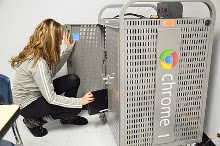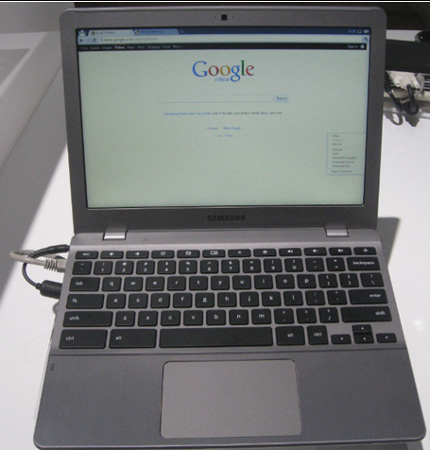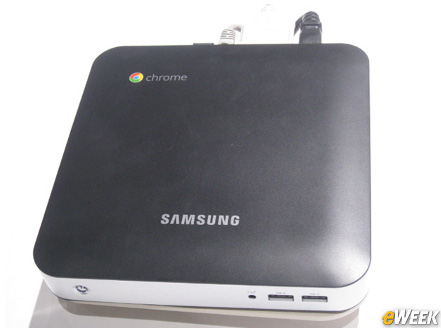Chromebooks pick up steam in the classroom
Jan 26, 2012 — by LinuxDevices Staff — from the LinuxDevices Archive — 2 viewsChromebooks from Samsung and Acer running Google's Chrome OS may not be catching on with consumers, but hundreds of schools across the country have adopted the web-oriented notebooks, the search giant claims. Earlier this month at CES, Samsung showed off a sleeker new version of the Chromebook that switches to a faster Intel Celeron processor, also promising it would release a “Chromebox” mini-PC.
High-tech watchers won't find many Chromebooks, outside of users who received test model Cr-48s or picked up Samsung Series 5 Chromebooks from attending Google I/0 last year. Sales have reportedly been limited to the tens of thousands since Samsung and Acer launched the Chromebook-branded notebooks last June.
The Intel Atom-based notebooks run on the open source, Linux-based Chrome OS, and let users access web-based applications through the lightweight operating system's Chrome browser. In November, both Acer and Samsung discounted their systems.


At left, fifth grade student teaches a younger student how to use a Chromebook in the Chrome Buddy project at Pontiac Elementary School in Richland School District Two in South Carolina. At right, East Leyden high school selects a Chromebook from the charging car in Illinois.
Source: Google
(Click on either to enlarge)
According to Sheth, students, faculty, and administrators appreciate the ease of use of the simple, lightweight machines, which depend on cloud storage and boot up in seconds. With Google handling all of the software maintenance in its cloud, including upgrading Chrome OS each month, IT administrators are freed up to apply their time and resources to other IT tasks, he adds.
In his blog post, Sheth included a testimonial quote from David Fringer, executive director for information systems at Council Bluffs Community School District in Iowa. "From my perspective, Chromebooks couldn't get any simpler; setting up this many laptops would have typically taken our team at least three months," stated Fringer.
Most of the school placements do not represent actual sales, however, as Google rents the Chromebooks to schools and businesses on a monthly basis in addition to selling them. The Samsung Series 5 and Acer A700 models each cost $20 a unit per month, plus $3 a device per month for built-in 3G. Schools may also buy the Samsung model for the year at $449, or $519 with 3G.
Here's how the schools in Iowa, Illinois, and South Carolina have gone Google with Chromebooks:
- Iowa's Council Bluffs Community School District is hashing out a Chromebook initiative for all 2,800 students in its two high schools. The district will use an additional 1,500 Chromebooks in two middle schools.
- Illinois' Leyden Community High School District pledged to roll out the devices to 3,500 students in its two high schools.
- South Carolina's Richland School District Two is seeding Chromebooks with 19,000 students.
Sheth compared Chromebook's momentum in the schools to where Google Apps was when it launched in February 2007. "At that time, educational institutions were the most interested, and it was inspiring to hear the different ways schools and districts had begun using Gmail, Calendar and Docs," Sheth wrote. "At FETC we've been similarly excited to see how teachers have formed communities around professional development for Chromebooks, districts all across the U.S. are piloting Chromebooks in their classrooms."
Samsung unveils new Chromebooks at CES
At the 2012 Consumer Electronics Show earlier this month, Samsung unveiled an updated version of its Series 5 Chromebook notebook, and teased a Chrome desktop box. Both devices will ship in the second half of the year, says the company.

Samsung's updated Series 5 Chromebook
The other major change is the addition of an Ethernet port as an alternative to the built-in Wi-Fi. As before, the notebook offers 16GB of storage and a 12.1-inch screen with 300-nit brightness.

Samsung Chromebox
Clint Boulton is a writer for eWEEK.
This article was originally published on LinuxDevices.com and has been donated to the open source community by QuinStreet Inc. Please visit LinuxToday.com for up-to-date news and articles about Linux and open source.